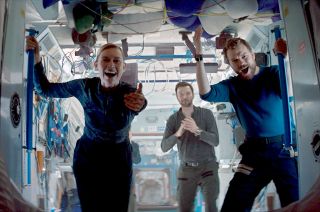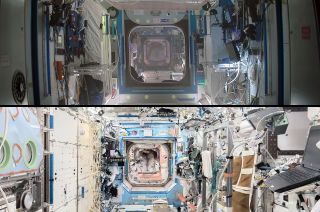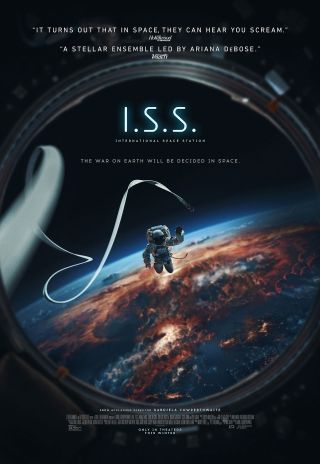'I.S.S.' filmmakers ground suspense thriller in realistic surroundings
' It looked like [they] had been building this ISS for decades.'

There are scenes in the new movie "I.S.S." that could be mistaken for NASA footage filmed aboard the real International Space Station (ISS).
For those familiar with the layout and look of the space station's many modules, there are recognizable details that the filmmakers successfully recreated. And that's a good thing, because if the title of your movie is "I.S.S." and you set all of your action aboard the ISS, then you better make sure that the ISS you show on screen matches the real International Space Station on which it is based.
Director Gabriela Cowperthwaite understood this and challenged her production team to get it right — all the way down to the condiments stuck to the wall.
"One of the things I learned through research is that, over the years, people have gone up to the ISS and brought stuff with them, and they lose track of their stuff all the time. For example, you take out a ketchup packet, and you don't see where it floats, so it just embeds itself against the wall," said Cowperthwaite in a interview released by the film's studio, Bleecker Street. "There's literally decades worth of stuff that's been gathering, and nobody's going to clean it, because there's more important work to do on the space station."
"I told that to Geoff [Wallace, the production designer], and he had so much fun incorporating it into the production design," said Cowperthwaite. "I was just blown away by his work. It looked like he had been building this ISS for decades."
Related: Watch the explosive new trailer for astronaut action film 'I.S.S.' (video)

To be fair, the real astronauts do set aside time each week to clean up after themselves, but there is a certain "clutter aesthetic" that has taken hold over the space station's 25 years and it is reproduced to good effect in "I.S.S." There are some liberties — some of the surfaces that are bare metal on the orbiting outpost have been painted white in the movie, for example — but overall the movie sets provide a believable surrounding for the events of the film to take place.
In "I.S.S," which opened in theaters on Thursday (Jan. 18), the inherent dangers that are associated with living and working on board a laboratory traveling at 17,500 mph at 250 miles above Earth (28,200 kph at 400 kilometers up) are surpassed by the motivations of the crew. Tensions flare when a worldwide conflict breaks out on Earth.
"Reeling from this, the astronauts receive orders from the ground: take control of the station by any means necessary," the film's synopsis reads.
For that scenario to come across as believable, it had to be grounded in reality. For Cowperthwaite, that meant turning to her experience as a documentarian. (Before "I.S.S.," her most well-known film may have been the 2013 documentary "Blackfish," which focused on SeaWorld and the controversy over captive orcas.)
"I think documentarians or folks who gravitate to that genre may tend to recognize when something feels performative versus when it feels genuine," Cowperthwaite said. "So it was exciting to watch professional actors embrace that approach and enjoy the freedom of fewer guardrails."
"I.S.S." stars Ariana Debose ("West Side Story," "Wish"), John Gallagher Jr. ("10 Cloverfield Lane," "Westworld") and Chris Messina ("Argo," "Air") as the three American astronauts aboard the ISS and Masha Mashkova ("For All Mankind"), Pilou Asbæk ("Ghost in the Shell," "Game of Thrones") and Costa Ronin ("The Americans," "Homeland") as their Russian crewmates.
"Ariana auditioned to play Kira before she won the Academy Award for 'West Side Story,' and you could see from her very first read just how magical she is," said Cowperthwaite. "She's so emotive, and that's important because you experience a lot of this movie through her perspective."
"You can see the slightest hint of joy, doubt or distrust on her face," Cowperthwaite said. "She telegraphs it beautifully without saying a thing, and I needed that level of emotional intelligence for one of my biggest protagonists."
In addition to conveying their feelings, the actors needed to learn how to work in what the production team called the "cage" in order to simulate the microgravity environment aboard the space station.
"We put the actors in harnesses and used tethers to float them," Cowperthwaite said. "Unfortunately, they were extremely uncomfortable to wear. It was hard on their bodies, they would sometimes go numb in their legs, and every time someone had to go to the bathroom, it took about 45 minutes to get them out of the harness and back into it again."
"And of course it took us a year or more to digitally remove every tether from every single frame of every scene in post," she said. "Looking back on it now, I see why people don't do zero-gravity in movies very often!"

Cowperthwaite said she knew almost nothing about spaceflight when she was first approached to direct the film. She learned everything that she could by watching every video she could find of the real ISS, tracing its history all the way back to its start. She was also inspired by reading "Endurance: A Year in Space, a Lifetime of Discovery" by former NASA astronaut Scott Kelly, who was the first American to spend almost 12 months off the planet.
"And I consulted frequently with former astronaut Garrett Reisman, who spent time on the ISS. He answered all of my questions and was probably my biggest touchstone on the project," she said.
Ultimately, all of the attention that went into recreating an accurate ISS for "I.S.S." was in support of what Cowperthwaite described as "a human story."
"It's six people who were in this lovely, singular universe that becomes a powder keg overnight," she said. "The question it asks is, in the most extreme situation, can people still find humanity in one another?"
Follow collectSPACE.com on Facebook and on Twitter at @collectSPACE. Copyright 2024 collectSPACE.com. All rights reserved.
Get the Space.com Newsletter
Breaking space news, the latest updates on rocket launches, skywatching events and more!
Join our Space Forums to keep talking space on the latest missions, night sky and more! And if you have a news tip, correction or comment, let us know at: community@space.com.

Robert Pearlman is a space historian, journalist and the founder and editor of collectSPACE.com, an online publication and community devoted to space history with a particular focus on how and where space exploration intersects with pop culture. Pearlman is also a contributing writer for Space.com and co-author of "Space Stations: The Art, Science, and Reality of Working in Space” published by Smithsonian Books in 2018. He previously developed online content for the National Space Society and Apollo 11 moonwalker Buzz Aldrin, helped establish the space tourism company Space Adventures and currently serves on the History Committee of the American Astronautical Society, the advisory committee for The Mars Generation and leadership board of For All Moonkind. In 2009, he was inducted into the U.S. Space Camp Hall of Fame in Huntsville, Alabama. In 2021, he was honored by the American Astronautical Society with the Ordway Award for Sustained Excellence in Spaceflight History.
